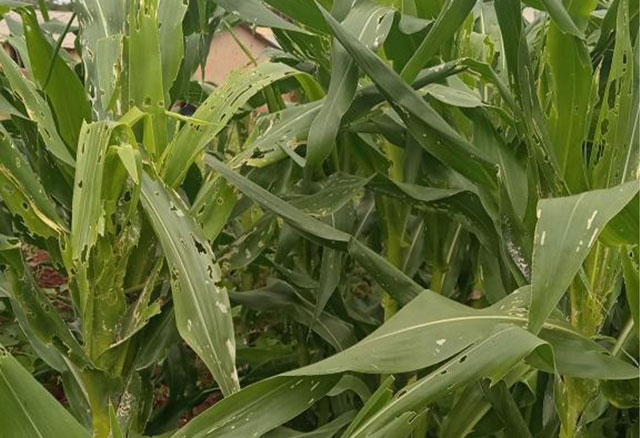
Gulu, Uganda | THE INDEPENDENT | Farmers in Gulu are worried about the outbreak of fall armyworms (FAW) in their maize crops in the gardens.
FAW also known as a butterfly is a pest of crops that attacks over 80 varieties of crops including maize, sorghum, sugarcane, cotton, rice and wheat among others.
It feeds on large numbers on the leaves, tassels, stems and reproductive parts of a plant that is at least two weeks old. Their damage appears as ragged-edged holes on leaves, tassels and severe feeding may give the appearance of corn that has been damaged by hail.
Lucy Lakot, a farmer in Gulu City says that the worm has in the last one week infested and destroyed the stems and leaves of almost an acre of her maize crops.
Lakot explained that the damages have left some of the crops withered, while others turned yellowish giving her less hope that they will flourish and produce corn.
She has been trying to manage the pests by sprinkling her maize crops with ashes mixed with water however this has yielded her no fruits.
Jacqueline Aceng, another farmer wondered how the pests attacked her maize crop gardens which she said she had maintained very well since the seeds planting period.
Aceng was also applying ashes on the moths of her maize crops with hopes of preventing the pests following advice from a colleague but this has been of no help.
Matthew Opiyo, a farmer in Bungatira Sub County is also crying out for help to prevent the pest which he says has destroyed almost three acres of his three weeks` old maize crops in the last two week.
However, Richard Sejjoba an agriculturalist from Agrithon in Gulu explains that Fall Armyworm is a dangerous crop pest that massively destroys the inner parts of the crops which give them the energy to grow.
He advised that once their crops are infested by the pests, farmers should spray their crops with recommended chemicals, and can also hand-pick. He further rooted the need for early planting and pests’ resistant crops.
The infestation of Fall Armyworms was 2016 registered in Uganda. The Food and Agricultural Organization (FAO) report of 2018 says that up to 17.7 million tonnes of maize could be lost annually due to FAW on the African Continent.
*******
URN
 The Independent Uganda: You get the Truth we Pay the Price
The Independent Uganda: You get the Truth we Pay the Price





